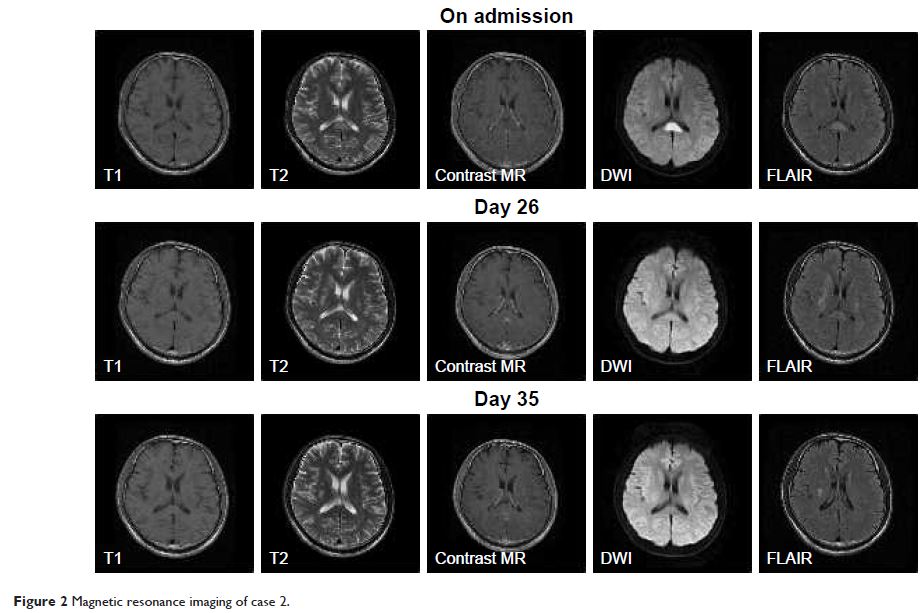9 0 8 0 2
论文已发表
注册即可获取德孚的最新动态
IF 收录期刊
- 2.6 Breast Cancer (Dove Med Press)
- 3.9 Clin Epidemiol
- 3.3 Cancer Manag Res
- 3.9 Infect Drug Resist
- 3.6 Clin Interv Aging
- 4.8 Drug Des Dev Ther
- 2.8 Int J Chronic Obstr
- 8.0 Int J Nanomed
- 2.3 Int J Women's Health
- 3.2 Neuropsych Dis Treat
- 4.0 OncoTargets Ther
- 2.2 Patient Prefer Adher
- 2.8 Ther Clin Risk Manag
- 2.7 J Pain Res
- 3.3 Diabet Metab Synd Ob
- 4.3 Psychol Res Behav Ma
- 3.4 Nat Sci Sleep
- 1.9 Pharmgenomics Pers Med
- 3.5 Risk Manag Healthc Policy
- 4.5 J Inflamm Res
- 2.3 Int J Gen Med
- 4.1 J Hepatocell Carcinoma
- 3.2 J Asthma Allergy
- 2.3 Clin Cosmet Investig Dermatol
- 3.3 J Multidiscip Healthc

与成年人爱泼斯坦 - 巴尔二氏病毒 (Epstein-Barr virus) 感染相关的伴胼胝体压部可逆性病变的轻度脑炎和深部脑白质病变
Authors Guo YJ, Wang SH, Jiang B, Li JL, Liu L, Wang J, Zhao WQ, Jia J
Received 24 February 2017
Accepted for publication 5 May 2017
Published 3 August 2017 Volume 2017:13 Pages 2085—2092
DOI https://doi.org/10.2147/NDT.S135510
Checked for plagiarism Yes
Review by Single-blind
Peer reviewers approved by Prof. Dr. Roumen Kirov
Peer reviewer comments 2
Editor who approved publication: Professor Wai Kwong Tang
Background: Approximately 200 cases of mild encephalitis with reversible splenial
(MERS) and deep cerebral white matter lesions have been reported since MERS was
first defined in 2004. MERS occurs more frequently in children; in adults, only
~60 cases have been reported. Until now, only four cases of MERS in adults have
been associated with Epstein–Barr virus (EBV).
Case presentation: We report three adult cases of MERS associated
with EBV infection in China. For all three patients, cranial magnetic resonance
imaging (MRI) indicated solitary reversible splenial and/or perilateral
ventricle white matter lesions with reduced diffusion. In the present report, all
patients were adults presenting with high fever, headache, apathy, and
confusion, as well as significant signs of meningeal inflammation. These
symptoms peaked 10–14 days after disease onset, with serious hyponatremia
(112–129 mmol/L), an elevated cerebrospinal fluid white blood cell count
(80–380/mm3), and significantly increased protein levels
(1,010–1,650 mg/dL). Cranial MRI indicated abnormal signal intensity in the
splenium of corpus callosum and symmetrically reversible lesions scattered in
the thalamus and deep cerebral white matter. The clinical symptoms tended to
improve after ~10–14 days of antiviral treatment. However, these patients
recovered more slowly than patients with viral meningitis.
Conclusion: MERS associated with EBV infection in adults
occurs less frequently but with more severe symptoms than in children. EBV
infection should be considered for patients with MERS symptoms. MERS has a good
prognosis.
Keywords: mild
encephalitis with reversible splenial lesions, Epstein-Barr virus, apathy,
hyponatremia, corpus fluid
